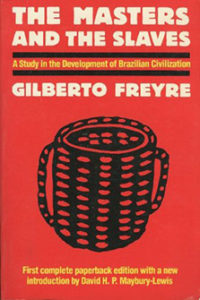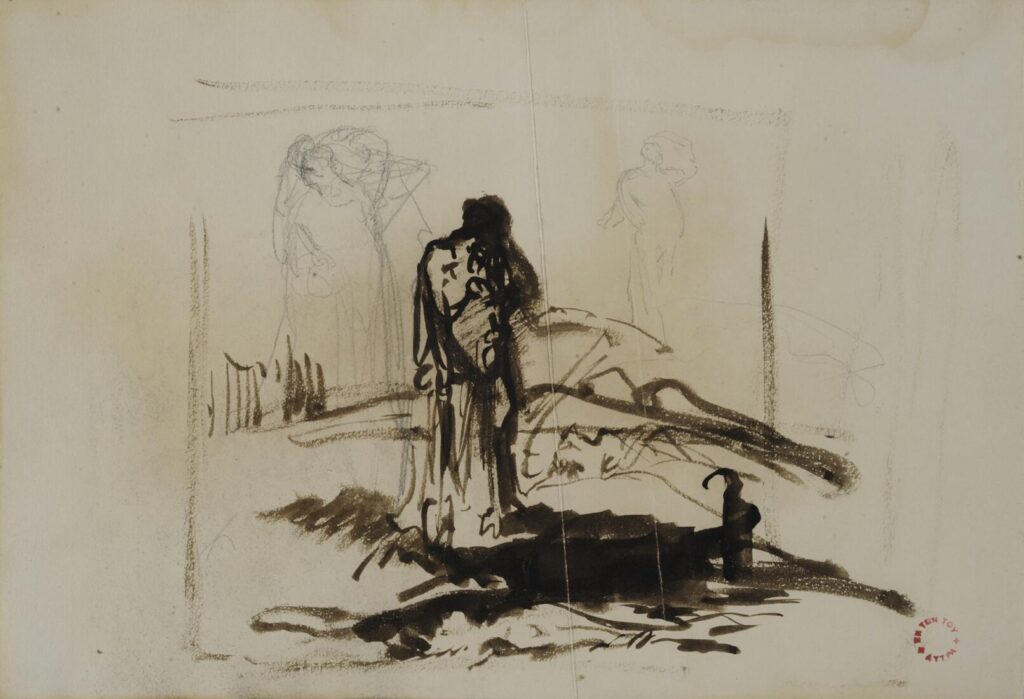By Ricardo Domeneck
One could say that Brazilian Poetry in Portuguese was born between the Sign of the Cross and songs of scorn. The Sign of the Cross was well represented by the priest and important writer Antonio Vieira, but our first great poet to write in Portuguese was Gregório de Matos (1636 – 1696), the amazing satirist, though he himself also produced much devotional work in religious sonnets. His work which seems most alive to us today, however, is his satyrical work. Today studied as part of our Baroque Literature, he is very interesting for our discussion of contemporary poetry for many reasons. Gregório de Matos, who was known as Hell´s Mouth because of his satyrical songs, paid for his sharp tongue with exile. His poems show us that our contemporary hypocrisy, Government corruption and violence have a long tradition, since Colonial times. One must note here, sadly, that even his work is at times stained by the racism of his times.
As the forerunner of Brazilian Literature in Portuguese, Gregório de Matos´s satyrical works and his language experimentation in several other texts begin a strong lineage of Brazilian poetry and prose – the satirical and scathing political criticism in which some of our strongest writers have excelled, from Tomás Antonio Gonzaga in his “Cartas Chilenas” in the 18th century, to 19th century writers like the great novelist Machado de Assis (1939 – 1908), or the playright and nonsense poet Qorpo-Santo (1829 – 1883), a forerunner of the 20th century surrealist and absurd poets – a man who was deemed crazy by his family but went on writing texts that would have made him a great friend to Alfred Jarry & Co.. Or yet Luiz Gama (1830 – 1882), a son of slaves who became an important lawyer and abolitionist, and directed his sharp tongue against the racism and violence of the society of his days.
Gregório de Matos´s experimentation at times with indigenous words in his poems also point later to Joaquim de Sousândrade and his “Wall Street Inferno” (see the first part of this article), though as Eduardo Sterzi has pointed out to me, there is a marked difference: the indigenous cultures are never presented as heroic in Gregório de Matos, the way they would be in Sousândrade and other poets of the 19th century.
And last but not least, in his very Baroque practice of appropriating texts from other writers (especially Spanish authors like Luís de Gôngora and Francisco de Quevedo), Gregório de Matos also appears to us as a forerunner for many contemporary poetic practices and estrategies which deal with text appropriation today. This can be felt in contemporary Brazilian poetry in many ways, used by a myriad of very different poets.
National Tradition and Identity
Like in Germany, where the obsession of a “national tradition” begins with the Romantics, it was in the 19th century, after the Independence from Portugal, that the Brazilian Romantic movement strove to create a “Brazilian Literature”, as a closed system. This would have consequences in literary criticism in the country for a long time.
But our first generation of modern writers, who came to maturity in the last two decades of the 19th century (and early 20th), would direct their eyes to Brazilian politics and society, creating some of our most powerful texts and the most scathing critiques the country had ever received. That was a first powerful generation to consistently create important works which could only have been written in Brazil, and yet had an undeniable international quality. In novels such as “The Posthumous Memoirs of Brás Cubas” (1881), by Machado de Assis; in the violent “The Atheneum” (1893), by Raul Pompeia; in the anti-epic “Os Sertões” (1902), by Euclides da Cunha – translated in the U.S. by Samuel Putnam as “Rebellion in the Backlands” and in Germany by Berthold Zilly as “Krieg im Sertão” – a report on the Canudos War, the bloodiest civil war in Brazil; in “The Sad Fate of Policarpo Quaresma” (1915), by Lima Barreto, in which a Brazilian nationalist who wishes the country would speak Tupy and have an independent and isolated culture, meets a sad end; or in poems by Joaquim de Sousândrade, Cruz e Sousa and Luiz Gama, Brazil is portrayed in its violence, racism and most enduring conflicts.
In the work of the Group of 1922, who rebelled against the literary establishment of their day and began a body of work created in the language spoken by the people, without archaisms, steering away from European tradition, this drive for a National literature, though often critical of the Brazilian elite, seems to us today way too often celebratory. It is with these modernist writers and thinkers that the concept of a racial democracy and miscigenation as a value, superior to the European fictitious notions of purity, became the foundational myth of the country for decades to come.
These writers were naturally also very critical towards the country, and here I must once again be thankful to Eduardo Sterzi for pointing out several instances in their work, such as Oswald de Andrade´s “Poems of the colonization” from the 1920s:
Levant
Oswald de Andrade
It is said a bunch were hanged
And the skulls in spikes
Of the uninhabited farm
Meowed at night
In the wind from the bush
And as Sterzi reminded me, Mário de Andrade ends his experimental novel “Macunaíma” (1928) with the massacre of the indians, only an parrot left alive to tell the story.
This is not the place to discuss the extremely complex and controversial ideas surrounding the mixed-race origin of the country, which fostered some of the most brilliant works in Brazilian writing from the 1920s to the 1940s. A required reading here would be the monumental work by Gilberto Freyre, “Casa Grande & Senzala” (Manor House and Slave Quarter, 1933), published in the United States as “The Masters and The Slaves”.

Gilberto Freyre, cover of one of the American editions of “The Masters and The Slaves”
What seems problematic to me, personally, is their (apparent) belief in the possibility of a unified culture, a “foundational myth” which is at the heart of every national epic. But as Wars with the Other have often been at the center of the foundational epics of other cultures, in Brazil such texts have always had to draw from Wars Within: as in the anti-epic of Euclides da Cunha on the Brazilian civil war in Canudos (from 1895 to 1897), with the massacre of the rebels camped in the city of Canudos, or as Sterzi points out, in Mário de Andrade´s foundational myth in “Macunaíma”, with a massacre of indians. Because any foundational myth for a country like Brazil will have to be forged in fraternal violence, brothers against brothers, brothers against sisters. Brazil is one huge common grave.
This is why the myth of a racial democracy, or Darcy Ribeiro´s belief in Brazil as a future Tropical Rome, has been an extremely conflicting notion in Brazilian culture since then, as the Government appropriates such ideas for propaganda and it is often presented as a peaceful process when it was engendered in the extremely violent relationship between the Indian, African and European peoples and their heritages, which undoubtedly form the country and its culture.
But nevertheless Oswald de Andrade remains one of the most important and influential writers of that group, who in his “Anthropophagic Manifesto” (1928) would give as a recipe for the creation of a genuine Brazilian culture by “eating foreign influences and digesting it in artifacts of our own”, based on the ritual cannibalism of certain Brazilian tribes, as the Kaetés, who believed one could assimilate the best qualities of an enemy by eating them.
Anthropophagic Manifesto (excerpts)
Oswald de Andrade
Only anthropophagy unites us. Socially. Economically. Philosophically.
The world’s one and only law. Masked expression of all individualisms, of all collectivisms. Of all
religions. Of all peace treaties.
Tupi, or not Tupi, that is the question.
Against all catechizations. And against the mother of the Gracchi.
I am only interested in what is not mine. Law of man. Law of the anthropophagus.
We are tired of all the distrustful Catholic husbands put in drama. Freud finished off the woman
-enigma and other dreads of printed psychology.
The one thing that trampled over truth was clothing, the impermeable layer between the inner world
and the outer world. Reaction against the clad man. American movies will tell.
Children of the sun, mother of the living. Fiercely met and loved, with all the hypocrisy of longing, by
immigrants, slaves and tourists. In the country of the great snake.
That is because we never had grammars or collections of old plants. And we never knew what was
urban, suburban, frontier and continental. Loafers on the world map of Brazil.
A participating consciousness, a religious rhythmics.
(…)
Joy is the real proof.In the matriarchy of Pindorama.
Against Memory as source of habit. The personal experience made anew.
We are concretists. Ideas take hold, react, burn people in public squares. Let us suppress ideas and
other paralyses. For routes. To believe in signs, to believe in instruments and stars.Against Goethe, the mother of the Gracchi, and the Court of Don John VI.
But there came no crusaders. There came fugitives from a civilization we are eating up, because we
are as strong and as vengeful as the Tortoise.
Naturally this has been the way cultures formed since immemorial time, Portugal itself being a product of Roman and then Arab civilizations in the territory, which left their indelible marks in the culture – a mixed-race culture itself, like any European country. Our language itself, Portuguese, is a fruit of such process, with its Latin and Arab marks.
But this has been extremely important as a program for the poets and artists of the post-war era in Brazil, who inherited these conflicts. The Concrete Poetry movement rescued the work of Oswald de Andrade from oblivion and was the first to accept some of his challenges, especially his idea that Brazilian artists should now export culture instead of importing it, and to create it in a critical way, digesting both national and foreign artifacts.


Décio Pignatari, “beba coca cola”
Some of the most brilliant responses to these questions were given by Brazilian artists in the 1960s, such as the ones who formed the Tropicalist Movement, and also artists like Hélio Oiticica and Lygia Clark.
§
“H.O.”, movie by Ivan Cardoso about Hélio Oiticica (English subtitles)
Brazil, which had been developing an extremely strong body of work, at the same time Brazilian and international, as we see in the poetry of João Cabral de Melo Neto, in the architecture of Oscar Niemeyer, in the music of João Gilberto, in the art of Alfredo Volpi, in the Concrete Poetry movement, with the Tropicalists and other artists of the 1960s, would be engulfed by a bloody Military Dictatorship in 1964, which exiled many of these artists, killed thousands and cut short this period of intense creation and political debate, making other strategies necessary for the next two decades.
Contemporary Brazilian poets and artists, who came to the scene after the end of the Dictatorship, would inherit these questions and dilemmas, and would have to find very particular ways to deal with these traditions and practices. For them, satire, conceptual theory and identity would have to be met head-on, but without dichotomies. In that sense, they are just as much inheritors of Oswald de Andrade. Today, however, I like to think of Mexican artist Pablo León de la Barra´s proposal of a slight twist in Oswald de Andrade´s program: Make your enemy eat you (and this stands here as a warn to you, dear reader).
The Satyrical I
Contemporary poetry in Brazil has often drawn its strength from this satyrical tradition. As also from the Goliards, nonsense and DADA, some of the best contemporary Brazilian poets have joined forces with these practices. This can be seen in the works of many poets, with very different estrategies: Ricardo Aleixo (b. 1960), Pádua Fernandes (b. 1971), Veronica Stigger (b. 1973), Angélica Freitas (b. 1973), Marcus Fabiano Gonçalves (b. 1973), Eduardo Sterzi (b. 1973), Fabiano Calixto (b. 1973), Paulo Ferraz (b. 1974), Dirceu Villa (b. 1975), Érica Zíngano (b. 1980), Fabiana Faleiros (b. 1980), or Ismar Tirelli Neto (b. 1985), to mention a few.
[MAKELLOSES GEBISS, hör mir gut zu:]
Angélica Freitas
MAKELLOSES GEBISS, hör mir gut zu:
du bringst es nicht weit.
tomaten sind es und zwiebeln, die uns stärken
und erbsen und möhren, du makelloses gebiss.
ja, stimmt, shakespeare ist auch nicht schlecht
aber was ist mit roter rübe, chicoree und kresse?
mit reis, bohnen und kohl?
strahlezähnchen, das rind das du isst
graste gestern auf feld & flur. und du am quengeln
das fleisch sei zu zäh.
zu zäh ist das leben, du makelloses gebiss.
aber iss nur, iss alles was dir zwischen die zähne kommt,
vergiss diesen schwatz
und nix wie rein mit dem besteck.
§
was dem geiger durch den Kopf ging, bei dem der tod die blässe noch betonte als er mit seinem schwarzen haarschopf und seiner stradivari beim großen flugzeugunglück von gestern abstürzte
Angélica Freitas
ce
de
e
ich denke an béla bártok
ich denke an rita lee
ich denke an die stradivari
und was meine karriere mich
alles gekostet hat
und jetzt versagt die turbine
und jetzt bricht die kabine entzwei
und jetzt fällt das ganze gerümpel aus den gepäckfächern
und ich falle auch
schön und bleich mit meinem schwarzen haarschopf
meine geige an die brust gedrückt
der typ vor mir betet
ich denke nur
ce
de
e
ich denke an stravinski
an den bart von klaus kinski
an die nase von karabtchevsky
an ein gedicht von joseph brodsky
das ich einst las
unversehrte damen lösen sie den gurt
was ist der boden so schön & und schon kommt er näher
one
two
three
§
ich schlafe mit mir/ auf dem bauch liegend schlaf ich mit mir/ auf der rechten
seite liegend schlaf ich mit mir/ ich schlafe mit mir und umarme mich selbst/
keine nacht ist so lang dass ich nicht mit mir schlafe/ wie ein troubadour der
an die laute sich klammert schlaf ich mit mir/ ich schlafe mit mir unterm
sternenhimmel/ ich schlafe mit mir während andere geburtstag feiern/ ich
schlafe mit mir manchmal mit brille/ und selbst im dunkeln weiß ich ich schlafe
mit mir/ und wer mit mir schlafen will muss neben mir schlafen
(Poems by Angélica Freitas translated by Odile Kennel, in Rilke Shake und andere Gedichte, Luxbooks, 2011)
§
Ballade vom fliegenden Heilkräuterhändler
Dirceu Villa
warum vertäust du, fliegender Händler
am Sonnenuntergang dein blaues Gebet
von Frühe und Federn, von Stroh und von Tau
von Buntglas und Glitzern in Dosen?
und wie ein Traum beleben sich Blätter
saugen an Furchen Fasern Adern
ein Sprießen, ein Knistern hallt wider
flackert nicht, haftet Blüte um Blüte an der Struktur:
dies hier befestigt sich wie ein Seil, atmet
verschwindet im Innern, Flaniern ohne Füße
nur Fließen, oh Wolkengewächs – Amulett aus Stein
trifft auf Brust, auf olivgrünes Tattoo
die rustikalen Räder der Dämmerung rattern
was für ein Lachen, sanftes Gelb durch die Scheibe
Hände wie rissige Erde, Fingernagelgalgant
fliegende Heilkräutertiere pflanzt du
pflückst im Grünen Insekten und Feuer
niemand, nicht mal ein Mysterium bewahrt
ganze Kontinente in einem Rauchwolkenkörper
in einem Hauch Spiralen aus flüssiger göttlicherGeometrie auf dem Grund der Tasse verdampfender Duft
warum erntest du, fliegender Händler
Jahreszeiten, trocknest Knospen
gesammelte Falter auf Nadeln?(Translated by Odile Kennel, published in the Neuer Rundschau 124. Jahrgang 2013, Heft 3)
§
Auszug aus einer Kritik in einer Sonntagsbeilage
Paulo Ferraz
I. (der Künstler: ein Porträt)
Die Vernissage des 32-jährigen
J.G.C. am Donnerstag macht
deutlich, dass hier ein
großer, wahrhaft zeitgemäßer
Künstler am Werk ist. Die
letzten 12 Jahre widmete
er sich Workshops, Kursen,
Reisen und Ausstellungsbe-
suchen, und so konnte
sein Werk reifen und hebt
sich deshalb von der für
Duchamps Doppelgänger
so typischen Naivität ab,
beherrscht der Künstler
doch Raum und Materie
meisterhaft, zeugt von
großer suggestiver Kraft
und ruft bei dem mit der
abgebildeten Realität
kaum oder gar nicht ver-
trauten Publikum in-
existente Gefühle hervor.
II. (der Künstler: Selbstdarstellung)
Von 20 bis 30 habe ich in Europa
studiert, eine intensive und
lehrreiche Zeit, aber entscheidend
für meinen Stil waren die zwei
Jahre nach meiner Rückkehr,
ich habe Monate auf der Straße
und in Favelas verbracht, hatte
mit Leuten in Sozialwohnungen,
Hütten oder der Gosse zu tun,
ich kenne sie und ihre Hunde
beim Namen, am Ende habe ich mich
sogar wie einer von ihnen gefühlt.
III (das Werk: Konzept)
Vor dem Hintergrund dieser
bizarren Erfahrung schleppte
er säckeweise Blechdosen in
die Galerie, Stapel von Pappe
(zum Anfassen für das Publikum)
und zwei Leiterwagen, die jeder
nach Belieben herumschieben
darf. Die Szenerie ist auf ihre
ganz eigene Art vergnüglich:
Es wird viel gelacht, zumal die
akademischen Muskeln dem kilo-
schweren Müll allzu oft nicht
gewachsen sind. Auch die übrigen
Exponate gewinnen in diesem
Universum der Ausgeschlossenen
noch an Tiefe: Betonbänke
(-betten), übersäht mit Ex-
krementen, alte Stofffetzen,
zum Trocknen in die Sonne ge-
hängt (einem Flutlichtstrahler)
– Fackeln in den Ritzen führen
durch den Raum –, kerosin-
getränkte Decken, die nur auf
ein Streichholz warten, und in der
Mitte eine authentische Baracke,
in die zehn Besucher passen.
Darin: alte Matratzen, Bretter
vor den Mauerritzen (wer auf-
merksam hinschaut, bemerkt die
unterschiedliche Beschaffenheit
der zahllosen Bretter), Töpfe,
in denen Reste kleben, vor Schmutz
starrende Wäsche – alles ziemlich
unhygienisch. Der Besuch dauert
höchstens zwei Minuten, und alles
wirkt so echt, dass sich bei der
Vernissage einige übergeben mussten.
Damit hatte J.G.C. gerechnet, wussten
doch die Besucher so wenig wie er,
was unbewohnbar bedeutet.
IV. (Schlussbemerkung)
Die vormaligen Bewohner
erhielten für die Baracke
und ihren Inhalt ein-
schließlich der Kleidung
einen fairen Preis, der es
der Familie ermöglichte,
aufs Land zurückzukehren,
von wo die Bedauernswerten
nie hätten weggehen sollen.
Sollten Sie neugierig
geworden sein, jedoch des
Drecks wegen Bedenken
haben: Mitarbeiter vor Ort
sorgen bei Verlassen
des Ausstellungsraumes
für sofortige Keimfreiheit.
(ah, es gab exzellenten Jahrgangswein)
§
Figuren (excerpt)
Eduardo Sterzi
Eduardo Stenzi
beging mit 18 Selbstmord.
Er gab sich der „Leidenschaft“ hin.
Das war damals en vogue.
Eduardo Sturzi,
Fürst der zahnlosen
Dichter,
ertrank in der Adria.
Zwei, drei seiner Freunde
ließen
Öl ins Meer
an seiner vermuteten Todesstelle
und steckten
es in Brand.
Eduardo Spencer,
der dank seines Fracks
in der Klatschspalte landete,
war nicht mal einen Monat verheiratet.
Denise ließ ihn für einen Uruguayer sitzen.
Eduardo Strazzi
starb vor Traurigkeit.
Dies zumindest vermutet seine Mutter,
behält es aber für sich.
Edoardo Stronzo,
der Dorftrottel,
der Narr ohne Hof,
der Dorfpolizistensohn: Was haben wir für ihn
von unserer Reise mitgebracht?
Eduardo Stelzi
litt an extremer Kleinwüchsigkeit.
Er probierte alle Gegenmittel aus.
Gab schließlich auf.
Erkrankte
an einer anderen Krankheit.
Magerte ab.
Heute macht er sich nichts mehr vor.
Eduardo Stesso
wurde immer mit seinem Zwilling Roberto
verwechselt.
Er erwog Haarefärben
und plastische Chirurgie.
Er sprach mit seinen Freunden darüber,
doch die rieten ihm davon ab.
Eduardo Esteves:
So hieß der Trainer
der Fußballmannschaft
des Flamengo Rio de Janeiro.
Ein Pseudonym.
Sein wirklicher Name: Mario Nikolaus.
Eduardo Stern,
angeblich verwandt mit H. Stern,
“und zwar ziemlich eng”.
Quälte jedesmal seine Enkel mit dieser fragwürdigen Information,
wenn er an der Bijouterie
in Copacabana vorbeikam.
Eduardo Stereo,
wie vorauszusehen, DJ.
Eduardo Sterli,
Finanzexperte, 53 Jahre,
behauptet nicht zu wissen, was eine Krise ist.
Als letztes Jahr an der Börse alle alles verloren,
sahnte er ab. Sein Geheimnis?
Verrät er nicht.
Eduardo Stecher,
begnadeter Redner,
gebildet, sympathisch.
Sein Nachname belastet ihn, er hat schon versucht, ihn zu ändern.
Eduardo Stretto,
Dirigent des Symphonieorchesters seiner Stadt,
glaubt, dass Nomen Omen sind.
Er schrieb ein Buch darüber, das jedoch keinen Verleger fand.
Eduardo Strezzi
erhält regelmäßig Post
an seinen Namen
mit nur einem z,
schlimmer noch, mit ss.
Eduardo Estéril
hat fünf Bastardkinder.
Seine Frau weiß von zweien. Von zwei weiteren ahnt sie etwas. Vom letzten, nicht einmal das.
Edoardo Stento,
Ingenieur aus Mailand,
besitzt ein Landhaus in der Toskana. Er vermietet es
an einen norwegischen Schriftsteller,
der seit zwei Jahren
kein Wort geschrieben hat, weil er es satt hat, Klischee zu sein,
es aber nicht lassen kann.
Eduardo Stenio,
Schauspieler, spielte einen großartigen Prospero
in der Inszenierung am Theater Jedermann.
Sein Name war für alle Preise im Gespräch.
Er erhielt nicht einen.
(Excerpt of “Personagens”, poem by Eduardo Sterzi, translated by Odile Kennel)
§
Fabiana Faleiros is a good example of a contemporary poet who draws from practices and estrategies which could in turn be called satyrical, conceptual, lyrical or performative. One of her only books published is her “Everything I Wrote in One Month”, which groups in one huge volume both the language and digital code of her production during that month, alligning her possibly to practices in the United States such as those of Kenneth Goldsmith or Vanessa Place. In her video “Reading Sings and the Like”, she simply reads the quotidian “visual / found textuality” that surrounds us on a daily basis.
Fabiana Faleiros, “Reading Signs and the Like”
As Dirceu Villa has said of her work, it´s poetry that questions itself as poetry, just as her music and performances question our notions of what music and performance can be. There is a break between genres which I find extremely healthy for contemporary practices.
The text is from one of Angélica Freitas´s “googlages”, something she had been working on in Brazil before FLARF poetry came to prominence in the United States. Below, the text in Hilary Kaplan´s translation:
“a woman goes” (googlage by Angélica Freitas)
a woman goes to the movies
a woman goes to get ready
a woman is going to ovulate
a woman is going to feel pleasure
a woman is going to ask for more
a woman is going to be crazy for you
a woman goes to sleep
a woman goes to the doctor, complaining
a woman begins noticing the growth of her stomach
a woman is going to spend nine months with a child in her belly
a woman goes to her first ultrasound
a woman goes into surgery and gets anaesthesia
a woman is going to get married have kids and take care of her husband and children
a woman goes to a healer for a serious haemorrhoid problem
a woman begins feeling abandoned
a woman begins wasting her primary follicles
a woman is going to regret it forever
a woman goes to the kennel ready to buy a dog
a woman goes to the back of the van and sits down weeping
a woman is going to put the house in order
a woman goes to the supermarket to buy provisions
a woman goes home to prepare the meal
a woman is going to stop trying to change men
a woman goes to the agency earlier
a woman goes to work, leaving the man in the kitchen
a woman goes away, leaving a gaggle of children
a woman is going to go out with someone else in the end
a woman is going to get a place in the sun
a woman is going to be able to drive in afghanistan
§
Poem by Fabiana Faleiros
The face is the most expressive part of the body
due to its close proximity to the brain.
.
Launched in our furthest extremities
one of the toes is called index on hands.
.
Away from the brain and close to the ground
are the soles of the feet.
(my translation)
One could also call both conceptual and satyrical the appropriation that Veronica Stigger makes of conversations heard in the street and then presented as poetry. One of her books, “Delírio de Damasco” (Damascus Delirium) works mostly with that practice. Some examples show us an X-ray of Brazilian mentality: the racism, the mysogny, the corruption. And also the way Brazilians use language:
Poor Indians!
They used to live in peace.
Then human beings came and killed them all.:
Here´s a good place.
There are only
rich men.:
When I was young,
I used to vomit
beautifully.:
He dreamed of becoming a waiter
in the United States.
He left for France.
But there was never a need to call these practices “conceptual” or “uncreative writing” in Brazil, since many of these estrategies already belonged to our satyrical tradition, as we can see on the famous page of Machado de Assis´s novel “The Posthumous Memoirs of Brás Cubas” (1881) or Oswald de Andrade´s found-text poetry from the 1920s.
 Page from Machado de Assis´s novel “The Posthumous Memoirs of Brás Cubas” (1881), the chapter titled “The Old Dialogue Between Adam and Eve”
Page from Machado de Assis´s novel “The Posthumous Memoirs of Brás Cubas” (1881), the chapter titled “The Old Dialogue Between Adam and Eve”
§
Analytical Lyricism
The debates on the death/need of assassination of the “I” (ich, je, eu, yo) in poetry raged in Brazil just as in many other countries. In Brazil specifically, the process was greatly influenced by one of the major poets of the post-war era, João Cabral de Melo Neto (1920 – 1999), and his distaste for anything too musical, subjective, emotional. Joined by the influence of the Noigandres Group (The São Paulo branch of the International Concrete Poetry Movement), such mistrust of anything too personal took hold of the Brazilian poetic debate and practice in the 1990s and early 2000s. In the past years, a few Brazilian poets seem to adopt the strategy of disarticulating the lyric voice from within, using several artifices, drawing from different sources: may they be the essays and poems of the L=A=N=G=U=A=G=E authors or French poets from the 1970s through the 1990s, such as Emmanuel Hocquard, Jean-Michel Epistallier, Charles Pennequin or Nathalie Quintane.
This could be felt in the 1990s in a poet like Marcos Siscar (b. 1964), who is an important reference for the discussion of these practices. This false dichotomy between subjectivity and objectivity was tackled by him in several poems, as in his “Ficção de começo”, translated below by German poet Jan Wagner.
Fiktion des Anfangs
Marcos Siscarinnen beginnen. im innern wo sie beginnen die dinge. ihre schwindelerregende ellipse zu ende bringen. das innere ist das ende des aufbruchs. beginn der rückkehr. sich aufmachen als kehrte man zurück. zurückkehren als machte man sich auf. die fiktion reise.
seiner eigenen sache nahe zu sein ist vom verlust nicht weit weg. sieh dort die hände des jugendlichen von kaltem schweiß bedeckt doch nicht in der lage die seiten eines buches umzublättern.
das innere ist der ort des verlusts. an dem man nicht bleibt. was für ein ort ist ein ort an dem man nicht bleibt? wenn man an die grenze gelangt. die grenze das innere.
das innere verläßt man. wie kleinstädte you know you have to leave. man bleibt nicht. im innern kommt man an. das innere verläßt man. man bleibt nicht dort wo man ankommt im innern. sand ziege stein und schrei. wo man jedoch nicht bleibt.
das innere verrät man verwirklicht man. verwirklicht es indem man es verrät. das äußere der dinge ist wenn man das innere verrät. deshalb gibt es kein reines außen keine reine poesie. jenes das man nicht verrät.
keine stille die nicht verraten würde.
im innern klingen die dinge hohl. zu sehen ist nichts. so hört das ohr nur hohle dinge klingen. unterm maulbeerbaum erklingt ein umgedrehtes boot das der fluß zurückgab.
die fiktion ursprung. die fiktion muß kultiviert die erinnerung gestutzt die lüge gestützt werden. der barmherzigkeit halber. alte geschichte lauer betrug der literatur.
die fiktion inneres ist ganz und gar wirklich. ist die erde. ein boden auf den man fallen kann. einen ort zu haben an dem man sich fallen lassen kann ist grund genug zum aufbruch.
das innere. wenn ich schon aufbreche will ich es nicht verlassen. hier beginnt alles mit einer art und weise den fall zu vermeiden. braucht einer der nie vom baum fiel sicherheit? kennt einer der sich vom baum geworfen hat den schmerz des falls?
(stille) spricht die stille
du klagst nicht bittest nicht akzeptierst nicht bleibst nicht rührst dich nicht vom fleck. das innere verschließt sich bietet sich dar. klette borstiges erbarmen.
§
I have elsewhere called these poets “analytical lyricists”. One example is Marília Garcia and her “it´s a lovestory and it´s about an accident”, shown in the previous article (see last week´s installment), in which by reordering the lines of her own lyric poem in alphabetical order, questions the so-called necessity of the lyrical impulse in expression. Everything could simply be other-wise. Narrativity and structure.
Another fantastic poet who should be mentioned here is Juliana Krapp (b. 1980). Unfortunately, her poems are very difficult to translate, as they are texts where the idea of subjective expression seems to be determined by language, grammar, context, etymology – these factors controlling and conditioning what is actually felt. As Brazilian novelist Clarice Lispector (1920 – 1977) once wrote: “I try to speak but not only do I not express what I feel as what I feel slowly becomes what I say.”
For those who speak Portuguese, I give you one of her poems:
Limite
Juliana Krapp
Sebe é um acúmulo de varas entretecidas
cerceando
por vezes sim por vezes não
eu sei
do esforço para persuadir
naturezas terríveis
simultaneamente
à graça dos perímetros
que permanecem estanques
(a dor de coabitar
tanto as frinchas quanto os
confinamentos)
Quando rarefeitos, os movimentos
aguardam mais do que a conclusão, preferem
o desdém e o resguardo
ou mesmo esse estalido
(um arquejo)
embalado
pelo embaraço hipnótico
das pequenas sombras
Somente as ventanias são de fato enamoradas
e apenas nelas alijam-se
as imundícias mais profundas
como somente os ramos
estraçalham-se e engravidam-se
num único carretel de músculos em escombros
(um aparelho de tensões
alimentado pelo ritmo
dos sumidouros)
§
Érica Zíngano is one poet who has been working on the border of subjectivity and objectivism, generating in many cases a strong satyrical effect. Subjectivity in her work is often only allowed as self-deprecation.
genre-theorie
Érica Zíngano
dieses gedicht ist, wie könnte es anders sein,
meiner mutter gewidmetLyrika® ist ein Medikament gegen Fibromyalgie, das meine Mutter jeden Abend (vor dem
Einschlafen) nimmt, wenn sie einen Schub hat. Fibromyalgie ist eine Art Rheuma – nur, dass sie
Muskeln, Sehnen und Bänder betrifft – und verursacht unter anderem Schmerzen, Müdigkeit,
Unwohlsein. Neben der Einnahme von Lyrika® (jeden Abend) vor dem Einschlafen geht meine Mutter
drei Mal pro Woche zur Physiotherapie, wodurch sie wesentlich weniger Schmerzen habe, berichtet
sie überzeugt. Lyrika® wird von Pfizer™ hergestellt, einem Pharmaproduzenten, der in der Sparte
Herzmedikamente den Markt dominiert: Norvasc® zum Beispiel, das meine Mutter auch nimmt (jeden
Abend vor dem Einschlafen), ist mit Sicherheit das am meisten verkaufte Medikament gegen
Bluthochdruck. Das nordamerikanische Unternehmen Pfizer™ wurde weltweit bekannt durch die
Herstellung von Viagra®, das meine Mutter wegen geschlechtlicher Unverträglichkeit natürlich nicht
nimmt.(dieses gedicht enthält daten aus Google Inc. die dichterin übernimmt im falle der weiterverbreitung
dieser angaben keine haftung. leider scheint das gedicht für Pfizer™ werbung zu machen, dem
anschein zum trotz garantiert sie, dass sie mit diesem gedicht ursprünglich nicht beabsichtigt hat, in
irgendeiner form werbung zu machen, sondern eine schlichte würdigung der regelmäßigen
medikamenteneinnahme ihrer mutter zu verfassen – wenn sie an dieser aufgabe gescheitert sein
sollte, bittet sie um entschuldigung und weist darauf hin, dass sie es weiter versuchen wird)
§
Érica Zingano: die Konservativen sollten mal was Nützliches tun
Seriengedicht, das durch die Sängerin Cláudia Leitte inspiriert wurde, die ins Guinness-Buch der
Rekorde kam, weil sie eine nie dagewesene Welle an Simultanküssen auslöste: 8372 Paare (was
16744 Personen entspricht) küssten sich auf dem Musikfestival Axé Brasil in Belo Horizonte am
3.4.2009 zu dem Hit “Ich will noch mehr Küsse” auf den Mund. Dieses Gedicht ist meiner Zahnärtzin
Dr. Laura gewidmet, die mir davon erzählte und mir auf diese Weise poetischen Stoff lieferte. Und da
ich nicht möchte, dass ihre Zahnarzthelferin Meire sauer auf mich ist, widme ich dieses Gedicht auch
ihr.1.
Manche behaupten
die
Heutige Poesie
sei am Ende
Damals
“im Goldenen Zeitalter
der Poesie”
seien
die Poeten
nach Art der Griechen
sportlicher gewesen
(zum Verständnis des Verhältnisses
von Sport und Körper
in der Klassischen Antike
vgl. Ilias)
schließlich
hat unser Guter
Alter
Luís de C’mões
über seinem Bad in der
Griechisch-Lateinischen Tradition
die Sportliche Betätigung
nicht vergessen
Im Gegenteil
C’mões war Soldat
und reichlich beeinflusst
von den Klassikern
aus ihm wurde der Größte Dichter
Portugiesischer Sprache
eigentlich aber
der Größte
Schwimmende
Dichter Portugiesischer
Sprache, denn als er
auf dem offenen Meer
Schiffbruch erlitt
rettete er sich
und seine Unersetzlichen Verse
schwimmend
im Freistil
hauptsächlich Kraul
Auf eine Art haben
die Konservativen Recht
C’mões ist
unschlagbar
mit Ganzkörpereinsatz
und viel Gutem Willen
rettete er
schwimmend
Die Lusiaden
Epos in 10 Gesängen
mit 1102 Strophen
Achtzeiler im diesem Fall
da aus je 8 Verszeilen bestehend
mit je 10 Silben
was also insgesamt
8816 zehnsilbige
Verse macht – Fakten
die
die Konservativen
nutzen sollten
für die längst
fällige Kampagne
“C’mões, ein Dichter,
ein Schwimmer:
vom Kanon
zum Guinness-Buch”
mit diesen Zahlen
käm er ganz sicher
ins Buch der Rekorde
erst recht wenn wir
bedenken
dass
er einäugig war
er schwamm
und schrieb dies alles
mit nur einem Auge
unglaublich!
Verlieren wir also keine Zeit
Guinness-Buch Jetzt
für den einäugigen C’mões!2.
Zu den wenigen
Schriftstellern
im Guinness-Buch
gehört der
südbrasilianische Dichter
Luiz de Miranda
er ist der einzig
Lebende Dichter
der Welt
mit einer Büste
auf einem
Fußballfeld –
was werden sie nur tun
wenn er stirbt
Ganz sicher
wird Luiz de Miranda
der einzige
Tote Dichter
der Welt
mit einer Büste auf
einem Fußballfeld sein
(vorerst zumindest
und wer weiß
wie lange)
Der Klassischen
Tradition zufolge
die Sport und Kultur
wertschätzt
hat Luiz de Miranda
Fußball gespielt in Uruguaiana
aber denken Sie
bloß nicht
der Sport
hätte ihn
vor der Bohème bewahrt
den Titel
des Nachtprotokollanten
überreichte ihm
Lupicínio Rodrigues persönlich
darüber hinaus war
Luiz de Miranda
Pate der Farra-Bar
in Recife
(wo
an der Wand
Photos von ihm
prangen)
und wurde
vom Haus des Dichters
zum Dichterfürst
von Rio Grande
ernannt
einer Tradition folgend
die 1916 ihren Anfang nahm
als Olavo Bilac
diesen Titel
Zeferino Brasil
verlieh
Deshalb und aus
anderen Gründen
sollten die Konservativen
die längst fällige
Kampagne
Guinness-Buch
für den einäugigen C’mões
in Angriff nehmen
denken Sie nicht?
3.
Noch eine Angenehme
Überraschung
(um nicht zu sagen
Illustre Anwesenheit)
im Guinness-Buch
ist das
Akademiemitglied
Paulo Coelho
der
zweimal ins Buch
der Rekorde kam:
zuerst 2003
weil er auf der
Frankfurter Buchmesse
der Meistsignierende
Autor seines Buches
in unterschiedlichen
Editionen war
und erneut 2008
weil Der Alchimist
das Meistübersetzte
Buch der Welt ist
(vorerst zumindest
und wer weiß
wie lange
in 67 Sprachen)
Und vorerst
ist es mit dem Zauber
Paulo Coelhos
nicht vorbei
als er am 25. Juli 2002
in die Brasilianische
Akademie der Sprache
auf Platz 21
zum Nachfolger
des Wirtschaftswissenschaftlers
Roberto Campos
gewählt wurde
und die Wahl
mit 22 Stimmen
und 15 Gegenstimmen gewann
(die der Soziologe
Hélio Jaguaribe erhielt)
meinte er, nun sollten sich
die Literaturkritiker
die ihn für einen schlechten
Schriftsteller
hielten
mit seinem Eintritt
in die Welt
der Unsterblichen
auseinandersetzen
Schenken wir doch
den Worten
seiner Antrittsrede
ein wenig
Aufmerksamkeit
“Und trotz allem
müssen wir singen
mehr denn je
müssen wir singen.”
Vinícius de Moraes
ist ein Meister
solcher Sätze.
In Erinnerung an
Gertrude Stein
und ihr Gedicht
“A rose is
a rose is a rose”
sagt er einfach nur
wir müssen singen.
Keine Erklärungen
keine Rechtfertigungen
keine Metaphern.
Als ich mich auf diesen
Platz bewarb und
wie es das Ritual verlangt
an die Mitglieder
der Casa de Machado
de Assis herantrat
hörte ich von
Josué Montello
ähnliches. Er sagte
zu mir:
“Jeder Mensch muss
der Straße folgen
die durch sein Dorf führt.”
Davon ausgehend
dass
Der Tejo schöner ist
als der Fluss
durch mein Dorf,
Aber der Tejo
ist nicht schöner
als der Fluss
durch mein Dorf
Weil der Tejo nicht
durch mein Dorf
fließt
bin ich überzeugt
dass
es keiner weiteren
plausiblen Argumente
bedarf
um die Konservativen
zu überzeugen
dass sie
etwas Nützliches tun
und den Großen Einäugigen
C’mões
vorschlagen sollten
fürs Guinness-Buch
der Rekorde
As some of the women associated with the L=A=N=G=U=A=G=E movement (Lyn Hejinian, Susan Howe, Rae Armantrout, Rosmarie Waldrop), some these Brazilian poets constantly probe against the too easily given connections between Genre and Gender.
TO BE CONTINUED










One thought on “Contemporary Brazilian Poetry, In The Singular: Giving Voice to a Few Tongues, Silencing Hundreds (in the best Brazilian style) (2)”
Comments are closed.